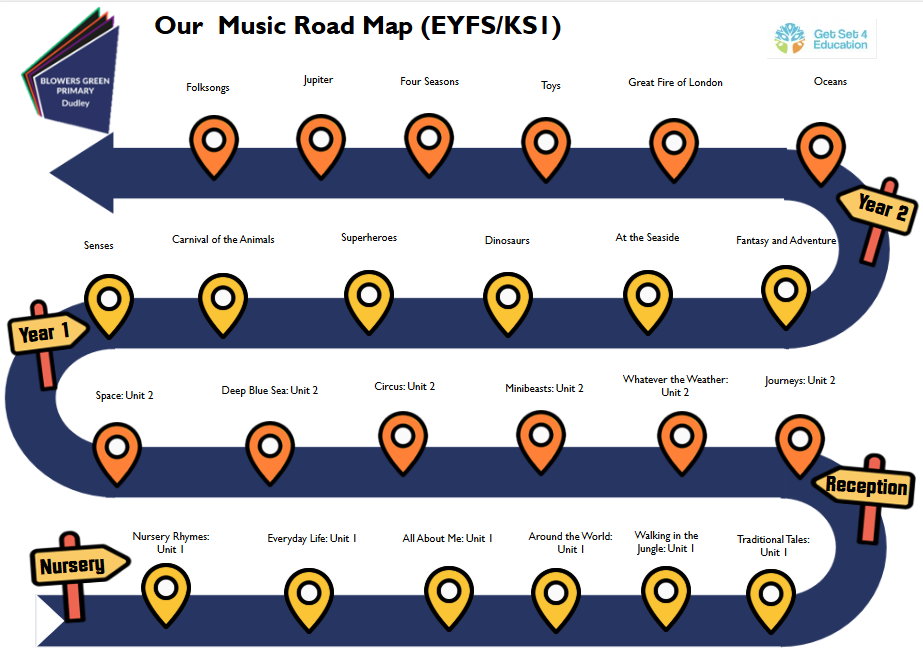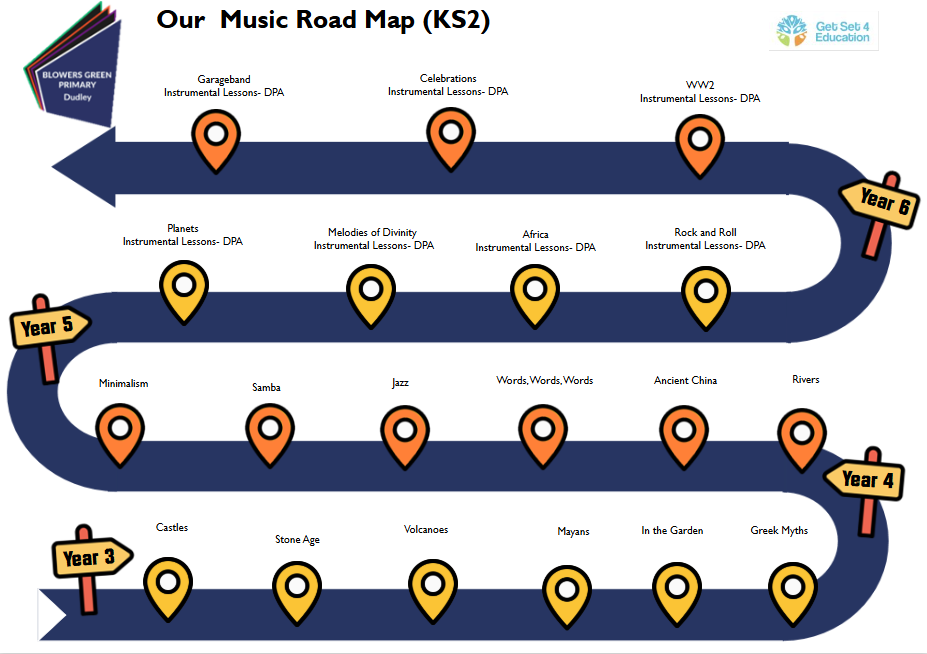Music
At Blowers Green our music curriculum is designed to inspire a lifelong love of music, nurture creativity, and develop confidence in self-expression.
Intent - What does the music curriculum intend to do?
We intend that children should master music to such an extent that they can go on to have careers within music and make use of music effectively in their everyday lives. Our children will be taught music in a way that ensures progression of skills, and follows a sequence to build on previous learning. Our children will gain experience and skills of a wide range of dimensions of music in a way that will enhance their learning opportunities, enabling them to use music in a wide variety of contexts, ensuring they make progress. In addition to this, we intend to give each child experience in learning an instrument during their time with us at Blowers Green.
“Music does bring people together. It allows us to experience the same emotions. People everywhere are the same in heart and spirit. No matter what language we speak, what colour we are, the form of our politics or the expression of our love and our faith, music proves: we are the same.
~ John Denver
Implementation – How is the music curriculum implemented?
At Blowers Green Primary, we deliver a high-quality, inclusive, and engaging music curriculum that enables all pupils to develop their musical abilities and appreciation. Following ‘Get Set 4 Music,’ our approach is carefully structured to ensure progression in musical skills, knowledge, and confidence, while fostering creativity and enjoyment. Each year group study musical artists exploring the lives and works of significant musicians across different genres, cultures, and historical periods. This learning is embedded within our curriculum to inspire pupils, deepen their musical understanding, and broaden their appreciation of diverse musical traditions.
Our curriculum follows a well-sequenced plan that builds on key musical concepts year by year. Weekly lessons are designed to develop listening, performing, composing, and appraising skills through practical and interactive activities. Music is taught by both class teachers and specialist music educators to ensure high-quality instruction.


Singing is at the heart of our music curriculum, with regular opportunities for pupils to develop their vocal skills, confidence, and enjoyment of music through whole-school singing, class-based activities, and performances.
During their time at Blowers Green, pupils have opportunities to learn and play a variety of instruments, including percussion and tuned instruments. Specialist teachers from DPA, deliver weekly clarinet lessons to children in Years 5 and 6.
Beyond the classroom, pupils regularly showcase their musical talents through participation in concerts, assemblies, and school productions, developing their confidence and performance skills. Blowers Green choir and music clubs provide additional opportunities for pupils to engage in music.
Impact – What progress will children make?
At Blowers Green, our music curriculum ensures that all pupils develop confidence, creativity, and a deep appreciation for music. Through engaging and progressive lessons, pupils make clear progress in their musical knowledge, skills, and understanding, preparing them for future learning and a lifelong enjoyment of music.
By the time pupils leave Blowers Green, they will have:
-
Developed a Secure Understanding of Musical Elements – Pupils will confidently recognise and use key musical concepts such as rhythm, pitch, tempo, dynamics, and notation in their listening, performing, and composing.
-
Gained Practical Experience in Singing and Instrumental Performance – All children will have performed both individually and in groups, using their voice and a range of instruments with increasing skill and expression.
-
Built Confidence and Creativity in Composition – Pupils will be able to create and refine their own musical pieces, using improvisation and structured composition techniques.
-
Grown in Cultural and Historical Awareness – Children will understand the significance of different musical traditions, composers, and genres, developing an appreciation for music from various cultures and time periods.
-
Enhanced Their Ability to Listen and Respond Critically – Pupils will be able to analyse and discuss music using appropriate vocabulary, articulating their thoughts and opinions on different styles and pieces.
-
Developed Collaboration and Performance Skills – Through group work, school productions, and public performances, pupils will build teamwork, resilience, and the confidence to present their work to others.
-
Recognised the Role of Music in Well-being and Everyday Life – Pupils will leave with an understanding of how music can be used for self-expression, relaxation, and social connection, supporting their emotional and mental well-being.
The impact of our curriculum is measured through ongoing assessments, teacher observations, pupil reflections, pupil voice and performance opportunities. By embedding music as a core part of our curriculum, we ensure that all children, regardless of background or ability, achieve their full musical potential and develop a lifelong love of music.
Aims of the Music Curriculum
The national curriculum for Music aims to ensure that all pupils:
In Key Stage 1:
-
Use their voices expressively and creatively by singing songs and speaking chants and rhymes
-
Play tuned and untuned instruments musically
-
Listen with concentration and understanding to a range of high quality live and recorded music
-
Experiment with, create, select and combine sounds using the inter-related dimensions of music
In Key Stage 2:
-
Play and perform in solo and ensemble contexts, using their voices and playing musical instruments with increasing accuracy, fluency, control and expression
-
Improvise and compose music for a range of purposes using the interrelated dimensions of music
-
Listen with attention to detail and recall sounds with increasing aural memory
-
Use and understand the stave and other musical notations. The musical elements of pitch, duration, tempo, dynamics, timbre, texture and structure are progressively introduced
-
Appreciate and understand a wide range of high-quality live and recorded music drawn from different traditions and from great composers and musicians
-
Develop an understanding of the history of music